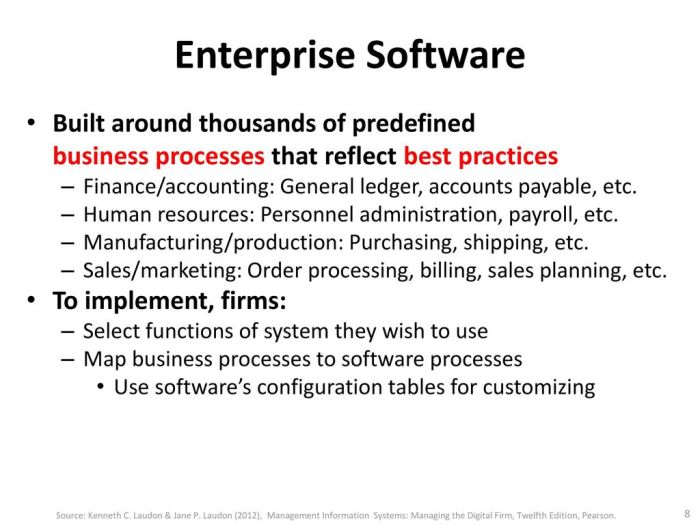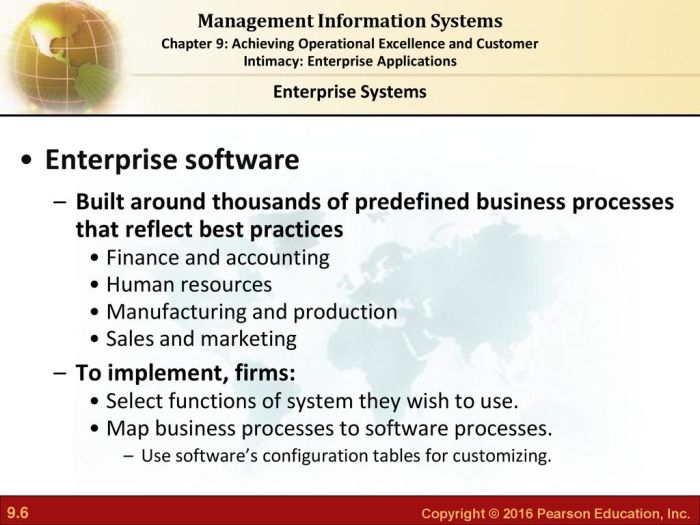Enterprise software includes a database and thousands of predefined functions, revolutionizing business operations with its unparalleled capabilities. This comprehensive guide delves into the significance of database integration and the advantages of predefined functionality, exploring how they enhance productivity, efficiency, and scalability in modern enterprises.
From data management and security to user interface design and system integration, this exploration unveils the multifaceted benefits of enterprise software, empowering businesses to thrive in the digital age.
Enterprise Software: Database Integration and Predefined Functionality: Enterprise Software Includes A Database And Thousands Of Predefined

Enterprise software is a critical tool for businesses of all sizes. It can help streamline operations, improve efficiency, and increase productivity. Two key features of enterprise software are database integration and predefined functionality.
Database Integration
Database integration allows enterprise software to access and manage data from a variety of sources. This can be extremely beneficial for businesses that need to track data from multiple departments or systems. For example, a manufacturing company might use enterprise software to track inventory levels, production schedules, and customer orders.
By integrating the data from these different sources, the company can get a complete view of its operations and make better decisions.There are a number of benefits to integrating a database into enterprise software. These benefits include:* Improved data accuracy and consistency
- Reduced data redundancy
- Enhanced data security
- Increased efficiency and productivity
However, there are also some challenges to integrating a database into enterprise software. These challenges include:* The cost of integration
- The complexity of integration
- The need for ongoing maintenance
Despite these challenges, database integration is a valuable feature for many businesses. By carefully planning and executing the integration process, businesses can reap the benefits of improved data management and decision-making.
Predefined Functionality, Enterprise software includes a database and thousands of predefined
Predefined functionality is another key feature of enterprise software. Predefined functionality refers to the out-of-the-box features that are included with the software. These features can save businesses a significant amount of time and money by eliminating the need to develop custom software.For
example, many enterprise software packages include predefined functionality for tasks such as:* Accounting
- Customer relationship management (CRM)
- Human resources management (HRM)
- Supply chain management (SCM)
By using predefined functionality, businesses can quickly and easily implement these essential functions without having to invest in custom development.There are a number of advantages to having thousands of predefined functions in enterprise software. These advantages include:* Reduced development time and costs
- Increased productivity and efficiency
- Improved standardization and consistency
- Reduced risk of errors
Predefined functionality can be a valuable asset for businesses of all sizes. By carefully selecting enterprise software with the right predefined functionality, businesses can streamline their operations and improve their bottom line.
Frequently Asked Questions
What are the benefits of database integration in enterprise software?
Database integration streamlines data management, enhances data accuracy, and facilitates real-time data analysis, empowering businesses with a comprehensive view of their operations.
How do predefined functions enhance productivity in enterprise software?
Predefined functions automate repetitive tasks, reduce coding time, and minimize errors, enabling businesses to streamline operations and focus on strategic initiatives.
How does enterprise software with a database and predefined functions support scalability?
The modular architecture of such software allows for seamless integration of additional modules and functions, enabling businesses to adapt and grow as their needs evolve.

